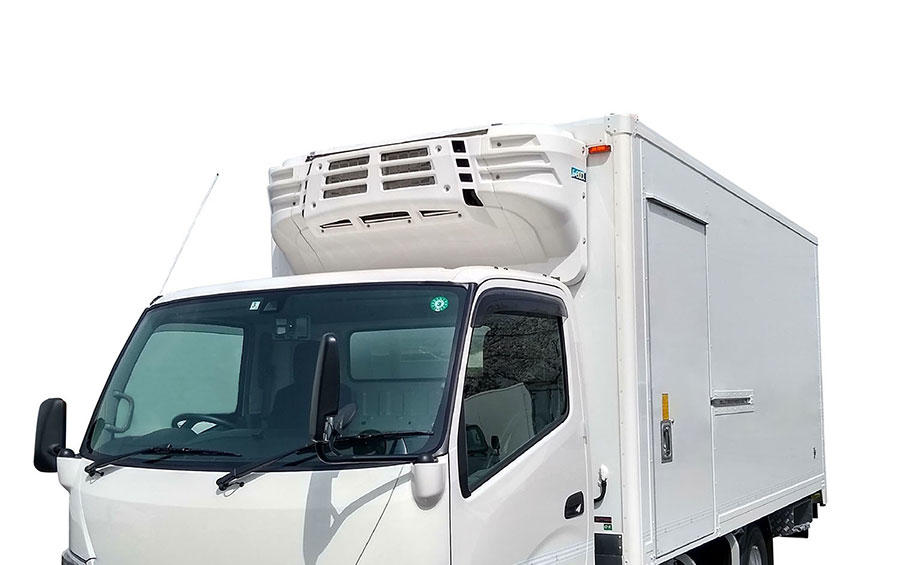Top Transport Refrigeration Companies Using Advanced Cold Chain Solutions
Top Transport Refrigeration Companies Using Advanced Cold Chain Solutions
Blog Article
A Detailed Review of the Systems Behind Refrigerated Truck Transport and Its Role in Food Safety
Chilled truck transportation is important in preserving food safety, utilizing sophisticated temperature control mechanisms and insulation modern technologies to secure perishable items during transportation. The combination of innovative monitoring systems guarantees real-time oversight, allowing for prompt treatment in case of temperature level inconsistencies. These important elements not only protect the honesty of foodstuff but likewise play a crucial function in avoiding foodborne illnesses. Recognizing how these systems function together elevates crucial inquiries regarding their performance and possible areas for renovation within the industry. What effects do these factors have for the future of food security?
Relevance of Refrigerated Transportation
Cooled transport plays a critical role in maintaining the integrity and security of perishable items throughout the supply chain (transport refrigeration companies). This specific logistics system is crucial for preserving the top quality of food products, including fresh fruit and vegetables, dairy products things, meats, and fish and shellfish, which are at risk to spoilage when revealed to temperature level fluctuations. The ability to maintain a constant and regulated setting ensures that these items retain their nutritional value, taste, and safety and security for consumers
Additionally, cooled transport lessens the dangers of foodborne illnesses, which can emerge from the growth of hazardous germs in incorrectly stored items. By sticking to rigorous temperature level demands, organizations not just abide with regulatory standards however likewise foster consumer trust fund and brand reliability. The financial implications are considerable; minimized spoilage prices equate to reduced losses for distributors and stores, adding to general productivity.
Additionally, the raising international need for fresh and top quality food even more stresses the relevance of cooled transportation. As supply chains end up being much more complicated and extend worldwide, the need for efficient temperature-controlled logistics remains to expand, underpinning the whole food circulation network and guaranteeing that perishable products reach their destinations securely and efficiently.
Temperature Level Control Devices
Keeping ideal temperature level control is vital in the transportation of disposable goods, and a selection of systems are utilized to achieve this goal. Refrigerated vehicles make use of sophisticated refrigeration systems, largely using vapor compression modern technology, which flows cooling agent through evaporator and condenser coils to remove heat from the cargo area. This process guarantees that the interior stays regularly cool, thus protecting the top quality and safety of the items being delivered.
In addition, vehicles are furnished with temperature level surveillance systems that offer real-time data on the interior environment. These systems typically consist of electronic sensors and alarms to sharp drivers in situation of temperature fluctuations, allowing immediate restorative actions. Some cooled vehicles additionally feature programmable temperature settings, allowing for accurate control customized to particular kinds of freight, such as fruits, pharmaceuticals, or vegetables.
Additionally, making use of pre-cooling methods prior to filling boosts the performance of temperature level control. By reducing the cargo area's temperature level before the intro of goods, the danger of temperature spikes throughout transportation is reduced. These systems jointly add to a dependable cool chain, important for keeping the honesty and security of subject to spoiling food products throughout the transport procedure.
Insulation Technologies
Insulation modern technologies play a critical duty in enhancing the performance of cooled vehicle transportation by decreasing thermal exchange between the freight area and the external atmosphere. Efficient insulation is important for preserving the required temperature for disposable products, consequently ensuring food safety and security and top quality during transportation.
Common insulation materials made use of in cooled vehicles consist of polyurethane foam, polystyrene, and fiberglass, each offering differing degrees of thermal resistance. Polyurethane foam, recognized for its premium shielding properties, is often applied as rigid panels that can be molded to fit the vehicle's inside. Polystyrene supplies a light-weight option while still offering sufficient thermal defense. Fiberglass, although less common, can be effective in particular applications as a result of its toughness and resistance to dampness.

Advanced Monitoring Systems
To make certain the stability of subject to spoiling goods during transport, advanced monitoring systems have become a crucial development in the cooled truck industry - transport refrigeration company. These systems make use of a mix of sensors, data loggers, and real-time monitoring modern technologies to continuously keep track of temperature, humidity, and total freight problems throughout the journey. By providing instantaneous feedback on ecological variables, these systems enable timely restorative activities, consequently securing product top quality
Modern keeping track of systems are furnished with cordless connection, making it possible for smooth data transmission to logistical centers and stakeholders. This connection facilitates remote tracking, which is necessary for maintaining compliance with market laws and requirements. Alerts can be produced in real-time, notifying operators of any kind of discrepancies read the article from pre-set thresholds, therefore minimizing the risk of wasting.
Furthermore, the assimilation of advanced analytics and artificial intelligence algorithms improves predictive abilities, permitting better planning and threat analysis. Historic data collected from these systems can educate future transport strategies, maximizing courses and reducing potential hazards. In general, the implementation of sophisticated surveillance systems stands for a substantial innovation in the refrigerated transport market, strengthening the commitment to protecting the high quality and safety of perishable items throughout their journey.
Effect On Food Safety Standards
The integration of sophisticated monitoring systems in chilled vehicle transportation has actually significantly affected food security criteria throughout the supply chain. These systems enable real-time tracking of temperature level, moisture, and other vital criteria necessary for maintaining the integrity read this post here of disposable items. By guaranteeing that products remain within defined temperature level varieties throughout transportation, these technologies mitigate the threat of microbial development and wasting, which are pivotal in food safety.

The fostering of data analytics likewise allows for aggressive decision-making, making it possible for companies to identify possible concerns before they intensify into food safety offenses. Therefore, the consolidation of innovative monitoring systems not just boosts operational performance but also fosters image source better responsibility in the food supply chain. This evolution underscores the crucial function of modern technology in raising food safety standards and guaranteeing customer self-confidence in the items they obtain.
Final Thought
To conclude, cooled vehicle transportation is important for keeping food safety via reliable temperature control, advanced insulation technologies, and continuous surveillance systems. These systems function synergistically to protect the top quality of perishable goods and lower the risk of foodborne illnesses. Adherence to stringent food safety standards is attained with the implementation of these modern technologies, highlighting the essential function of cooled transportation in the food supply chain and its influence on public health and wellness.
Chilled truck transport is vital in keeping food safety and security, using advanced temperature level control devices and insulation modern technologies to safeguard subject to spoiling products throughout transit - transport refrigeration companies. Proper maintenance of insulation integrity, consisting of routine checks for wear or damage, is likewise necessary to receive the efficiency of chilled transport systems and make sure compliance with food safety laws
The assimilation of innovative surveillance systems in refrigerated vehicle transport has substantially affected food safety and security standards throughout the supply chain.In verdict, refrigerated vehicle transportation is important for preserving food security via efficient temperature control, progressed insulation modern technologies, and continual surveillance systems. Adherence to rigorous food safety and security requirements is achieved with the implementation of these innovations, highlighting the crucial role of chilled transport in the food supply chain and its influence on public health and wellness.
Report this page